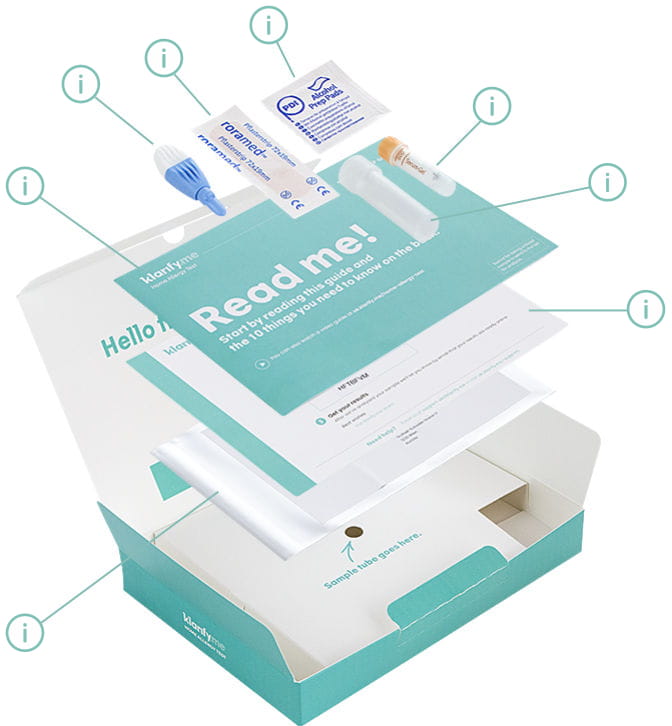Pet allergy test
Think you might be allergic to your pet? Allergies to dogs and cats are common but other pets can also cause allergies. Pets such as horses, rabbits, rats, guinea pigs, mice, hamsters and horses may also cause allergies.
If you sneeze a lot when you’re with your pet, if your skin becomes itchy, your nose starts running and you get watery, itchy eyes it might be the allergens from the animal which are causing the symptoms of allergy.
But how do you find out if it's the pet which is causing those symptoms or something else? Testing for pet allergy can start with the Home Allergy Test. It's a first step to finding out if your pet might be causing your allergy symptoms. The Home Allergy Test is easy to use and it's backed by science. It offers comprehensive testing for pet allergies.
About the pet allergy test
The Home Allergy Test has everything you need to collect a small blood sample from your fingertip. Set aside about 30 minutes to do it. There’s a step-by-step guide to help you and you can also watch our how-to video.
Once you've collected your blood sample you have 24 hours to get it in the post to our partner lab. We ask you to post it within 24 hours to make sure the sample is stable and suitable for testing. There's a prepaid envelope included in the kit.
Using sophisticated technology, your blood will be analysed for your body's reaction to 294 different allergens. The Home Allergy Test includes testing for 25 pet allergens and components including cat, dog and horse.
When you do the test, it's important to register your test online, which creates your account. The test kit includes instructions on how to do this. The results of your pet allergy test will be available in your online account within two weeks.
The comprehensive and reliable results of your allergy test will show the level of specific Immunoglobulin (IgE) antibodies in your blood. IgE is an antibody produced by the immune system to protect us from outside intruders such as parasites. IgE also plays a vital role in cat allergy, dog allergy, pet allergies as well as other allergies.
By testing for and identifying specific IgE antibodies in your blood, the Home Allergy Test can give an indication of your sensitisation to potential allergy triggers.
Order your Home Allergy Test today and take the first step towards finding out if you might have pet allergies.
Many allergens, one test
The Home Allergy Test tests and analyses your body’s reaction to 294 different allergens including:- Pollen 59
- Pets 25
- Insect stings 10
- Moulds & yeasts 13
- Foods 154
- Other 14
Symptoms of pet allergies
Allergy symptoms can start very soon after coming into contact with allergens from your pet, or they might take longer to develop. Some people may only experience mild symptoms of pet allergy and find them fairly easy to manage. But in other people, allergies such as dog allergy or cat allergy or other pet allergies can be more than just a nuisance. /p>
One of the symptoms of pet allergy is allergic rhinitis. Allergic rhinitis affects the lining on the inside of your nose. It's an inflammatory condition. Symptoms of cat allergy, dog allergy or another pet allergy are similar to symptoms of the common cold. The difference is a cold is caused by a virus. Allergic rhinitis is triggered by an allergic reaction.
In an allergic reaction, your immune system is overreacting to a substance that's normally harmless. It's trying to get rid of the substance it has mistakenly interpreted as a threat. A chain of reactions is set off in defence.
Pet allergy typically causes symptoms such as:- Stuffy, runny nose
- Sneezing
- Itchy nose
- Itchy, red or watery eyes
- Coughing
- Breathing difficulties
- Tight chest or wheezing
- Eczema/skin rash/hives
- Anaphylaxis
If you are allergic to your pet you may experience one or more of the allergy symptoms above. Symptoms of allergy can vary from person to person.
All you need is in the box
Prepaid return envelope
Use this to send your sample to the lab
Welcome card
Includes your unique activation code and instructions how to use it
Step-by-step guide
Start by reading this guide and the 10 things you need to know on the back
Lancing device
Sterile device to prick your fingertip to obtain a small blood sample
Plaster
To put on your fingertip after collecting the blood sample
Alcohol wipes
Use to sanitise your finger
Transport tube
Filled sample tube goes into the transport tube. Both tubes are then sealed into the prepaid return envelope for posting to the lab
Sample tube
Tube to collect about 6 drops of blood










Why you should get tested for allergies to your pet
Allergy testing may help you find out if pet allergens could be triggering your symptoms. And rule out others. Allergy testing for specific IgE antibodies in your blood can show if you're sensitised to allergens from your pet. But it doesn't necessarily mean you're allergic to them. Allergy testing for sensitisation can be a first step in finding out if you have allergies. In order to make a diagnosis of allergy, your doctor will look at your medical history, your experience of allergy symptoms in combination with any allergy test results.
Uncontrolled allergy symptoms may impact your everyday life. Living with allergies can affect how well you're able to concentrate at work or school. Allergy symptoms can affect your sleep too, making you tired the following day. And allergies can have an impact on your social activities with friends and family, especially if they have pets and you have a dog allergy or a cat allergy. Severe allergy symptoms may affect your emotional and mental health.
We believe allergy testing is worthwhile. Why? Well, when you know what's causing your allergy symptoms, you're in a better position to know how to manage them. Allergy testing can help you find out. With an accurate diagnosis of allergy, you'll be able to discuss treatment options with your doctor. And get access to the most suitable treatment for you.
Pet allergy: a closer look
Cats and dogs and other pets produce many proteins that have the potential to cause allergy. A lot of people think it's the hair or fur of the pet that causes symptoms of allergies. But pet allergy is caused by the protein in the animal's saliva, urine or dander coming into contact with your eyes, nose, mouth or skin. Dander is the name for particles of their shed skin. Pet dander is one of the most common causes of pet allergy.
Allergy is caused by our immune system overreacting. The job of our immune system is to protect us from infectious bacteria, viruses, fungi and parasites. But if you have a pet allergy, allergens from pets are perceived as a threat and your body takes defensive action to try and get rid of the threat, as quickly as it can.
It's unlikely you'd have an allergic reaction the first time you come into contact with a pet. There's a process to how allergy develops. It's called sensitisation.
Sensitisation begins with your body registering the allergen from the pet as something that may be harmful. The structure of the allergen is recorded so that specific IgE antibodies can be produced in defence. You're sensitised when you have specific IgE antibodies in your blood. Once you've been sensitised to pet allergens your body will produce IgE antibodies each time you come into contact with that allergen again.
When you next come into contact with an allergen from your pet, the specifically built IgE antibodies recognise it and the chain of allergic reaction begins.
Sensitisation isn't the same as an allergy. It's the first step of developing an allergy. Sensitisation doesn't always mean you'll experience symptoms. But importantly, symptoms don't develop without going through the process of sensitisation. Some people can be sensitised to allergens from a pet without having an allergic reaction to them. But you can't be allergic to allergens from your pet without being sensitised first.
Detecting sensitisation can be a useful tool to identify potential allergy triggers. Being diagnosed with allergy means you're both sensitised and experience an allergic reaction.
Others say
"Very clear instructions and the packaging is high quality. Looking forward to receiving the results." - Sara P
"I got the results and I have to say, I am very impressed.
I have only ever noticed suffering from sensitivity to cats, dust and a bit on grass before moving house at the end of Feb and I’ve always been able to control these reactions with off the shelf antihistamine, the test confirmed sensitivity to all of these.
Since moving I have suffered badly from a far more severe reaction to something unknown, I had assumed it was pollen from the symptoms as I am now surrounded by trees and flowering plants and there is a park behind the house, so plenty of grass too. My hope when taking the test was to find out if this new issue was a general sensitivity or if there was something specific in my new environment which was causing it. I am delighted that the test came back with such a strong positive on Ash tree pollen along with a moderate on Olive (which as I’m reading are in some way connected) while showing no sensitivity to other tree pollen types at all.
Having checked the pollen season for Ash trees it seems to coincide really well with when I had my symptoms, I.e. through March and April I was really bad but its clearing up now in May to the point that its negligible now. Looking around outside I think I’ve spotted the culprit at the back of my garden right next to where I’ve been sitting when outside!
I was sceptical about spending the money on this but at the time my symptoms were so harsh I think I’d have tried almost anything! I’m so glad that I did this now." - Rob S.
"Great product! For a while now, I have suspected that my son might have an allergy. I was leaning towards tree or grass pollen, but he didn’t really seem to be consistently bothered when being outside. I bought the home allergy test to understand what he was sensitised to. The guide that comes with the product, made it a simple exercise to complete the test. Drawing the blood took about 20 seconds, and there is really little hassle at all.
The report came back within a couple of weeks and showed high sensitisation to house dust mite. Didn’t think of that beforehand. So now we know where to focus and we have had dialogue with our doctor for next steps and proper treatment." - Morten S.

